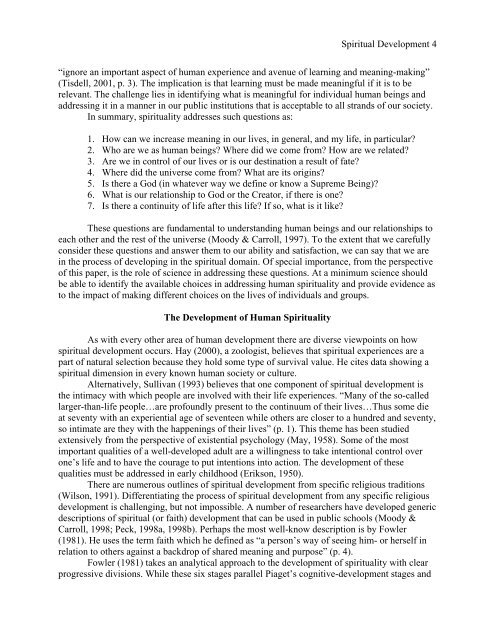The Gift of Spirituality
The Gift of Spirituality
The Gift of Spirituality
Create successful ePaper yourself
Turn your PDF publications into a flip-book with our unique Google optimized e-Paper software.
Spiritual Development 4<br />
“ignore an important aspect <strong>of</strong> human experience and avenue <strong>of</strong> learning and meaning-making”<br />
(Tisdell, 2001, p. 3). <strong>The</strong> implication is that learning must be made meaningful if it is to be<br />
relevant. <strong>The</strong> challenge lies in identifying what is meaningful for individual human beings and<br />
addressing it in a manner in our public institutions that is acceptable to all strands <strong>of</strong> our society.<br />
In summary, spirituality addresses such questions as:<br />
1. How can we increase meaning in our lives, in general, and my life, in particular?<br />
2. Who are we as human beings? Where did we come from? How are we related?<br />
3. Are we in control <strong>of</strong> our lives or is our destination a result <strong>of</strong> fate?<br />
4. Where did the universe come from? What are its origins?<br />
5. Is there a God (in whatever way we define or know a Supreme Being)?<br />
6. What is our relationship to God or the Creator, if there is one?<br />
7. Is there a continuity <strong>of</strong> life after this life? If so, what is it like?<br />
<strong>The</strong>se questions are fundamental to understanding human beings and our relationships to<br />
each other and the rest <strong>of</strong> the universe (Moody & Carroll, 1997). To the extent that we carefully<br />
consider these questions and answer them to our ability and satisfaction, we can say that we are<br />
in the process <strong>of</strong> developing in the spiritual domain. Of special importance, from the perspective<br />
<strong>of</strong> this paper, is the role <strong>of</strong> science in addressing these questions. At a minimum science should<br />
be able to identify the available choices in addressing human spirituality and provide evidence as<br />
to the impact <strong>of</strong> making different choices on the lives <strong>of</strong> individuals and groups.<br />
<strong>The</strong> Development <strong>of</strong> Human <strong>Spirituality</strong><br />
As with every other area <strong>of</strong> human development there are diverse viewpoints on how<br />
spiritual development occurs. Hay (2000), a zoologist, believes that spiritual experiences are a<br />
part <strong>of</strong> natural selection because they hold some type <strong>of</strong> survival value. He cites data showing a<br />
spiritual dimension in every known human society or culture.<br />
Alternatively, Sullivan (1993) believes that one component <strong>of</strong> spiritual development is<br />
the intimacy with which people are involved with their life experiences. “Many <strong>of</strong> the so-called<br />
larger-than-life people…are pr<strong>of</strong>oundly present to the continuum <strong>of</strong> their lives…Thus some die<br />
at seventy with an experiential age <strong>of</strong> seventeen while others are closer to a hundred and seventy,<br />
so intimate are they with the happenings <strong>of</strong> their lives” (p. 1). This theme has been studied<br />
extensively from the perspective <strong>of</strong> existential psychology (May, 1958). Some <strong>of</strong> the most<br />
important qualities <strong>of</strong> a well-developed adult are a willingness to take intentional control over<br />
one’s life and to have the courage to put intentions into action. <strong>The</strong> development <strong>of</strong> these<br />
qualities must be addressed in early childhood (Erikson, 1950).<br />
<strong>The</strong>re are numerous outlines <strong>of</strong> spiritual development from specific religious traditions<br />
(Wilson, 1991). Differentiating the process <strong>of</strong> spiritual development from any specific religious<br />
development is challenging, but not impossible. A number <strong>of</strong> researchers have developed generic<br />
descriptions <strong>of</strong> spiritual (or faith) development that can be used in public schools (Moody &<br />
Carroll, 1998; Peck, 1998a, 1998b). Perhaps the most well-know description is by Fowler<br />
(1981). He uses the term faith which he defined as “a person’s way <strong>of</strong> seeing him- or herself in<br />
relation to others against a backdrop <strong>of</strong> shared meaning and purpose” (p. 4).<br />
Fowler (1981) takes an analytical approach to the development <strong>of</strong> spirituality with clear<br />
progressive divisions. While these six stages parallel Piaget’s cognitive-development stages and

















